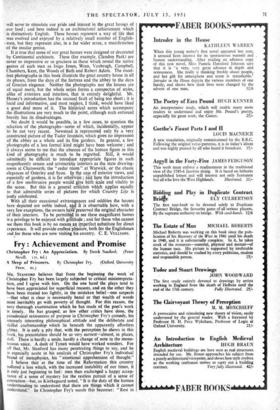Fry : Achievement and Promise
Christopher Fry : An Appreciation. By Derek Stanford. (Peter Nevill. 12s. 6d.) MR. STANFORD believes that- from the beginning the work 'of Christopher Fry has been largely subjected to critical misinterpreta- tion, and I agree with him. On the one band the plays tend to have been appreciated for superficial reasons, and on the other they have been treated too lightly, in the mistaken belief—one suspects —that what is clear is necessarily banal or that wealth of words must inevitably go with poverty of thought. For this reason, the very thorough examination which he has made of the poet's work is timely. He has grasped, as few other critics have done, the paradoxical seriousness of purpose in Christopher Fry's comedy, his intensely interesting philosophical attitude and the deliberate and skilful craftsmanship- which lie beneath the apparently effortless glitter. It is only a pity that, with the perception he shows in this book, his presentation should be so very earnestalmost, in places, dull. ' There is hardly a smile, hardly a change of note in the mono- tonous voice. A dash of Tynat would have worked wonders. For all that, Mr. Stanford has many penetrating things to say, and he is, especially acute in his analysis of Christopher Fry's individual brand of metaphysics, his " emotional apprehension of thought." I believe that at the time of the Reformation this country suffered a loss which, with the increased instability of our times, it is only just beginning to feel : men then exchanged a happy accep- tance of a sense of mystery for the restless pursuit of a sense of conviction—but, as Kierkegaard noted, " It is the duty of the human understanding to understand that there are things which it cannot understand?' in Christopher Fry's words this becomes: " Rest in the riddle, rest ; why not ? " Mr. Stanford has seen that it is this rich- but neglected mine of wonder into which Christopher Fry is digging. With his latest play, however, A Sleep of Prisoners, Christopher Fry has carried his metaphysical explorations a good deal further, and though it is bad luck on Mr. Stanford that his book should have been completed for press before A Sleep of Prisoners appeared, it is to his credit that the lines of development which he has traced in Christophep Fry's earlier work have, in fact, all converged with a vengeance in this latest play.
Mr. Stanford sub-titles his book " An Appreciation," and there are, indeed, only two paragraphs devoted to adverse comment. In these the charges he levels at Christopher Fry are those of prolixity and sentimentality. I do not wish to imply that I find the work of Christopher Fry faultless, but my own impression from reading the plays is that the occasional longueurs are due more to over-charging than to-prolixity, whilst of sentimentality I can find not a trace. It is, I believe, this matter of over-charging that has led to the bewildered reception by many critics of A Sleep of Prisoners. Almost without exception they have either not understood the play or have over-simplified its meaning. We have been told that the theme is " the futility of force," or that " violence and war are of man's creating," or that " murder must breed murder to the end of history." Perhaps because Christopher Fry has chosen—appro- priately enough—a war setting, people have concluded too hastily that the play is little more than an impassioned pacifist tract. In point of fact, " the enterprise," in Mr. Fry's own words, is no less than " exploration into God."
Speaking of obscurity, Mr. Stanford says: "Accosted with words on the printed page, the reader can return to pick up the dropped stitch : actors, however, will not repeat their lines. Verse, for the stage, must take effect at once." I am not sure to what extent this is absolutely true. Obviously, there is a minimum of immediate entertainment or interest below which a play must not fall ; but there are, equally obviously, works of art which will only yield their ultimate riches after prolonged acquaintance, and I believe A Sleep of Prisoners to be such a work. It contains little of the scintillating verbal virtuosity of the earlier plays ; its strokes are broader, bolder and deeper than anything Christopher Fry ha's so far done. It 'is extremely moving in its sincerity. Speech after speech is heavily loaded with precise, if often unusual, thought which all adds up to a profoundly religious statement—a belief, as Mr. Stanford points out, that " there is a view of the world according to which the paradox ' is above every system " (Kierkegaard). It is not surprising, then, that Mr. Fry is wary of spiritual dogma which, in Mr. Stanford's words, " by its over-assertiveness may bludgeon tentative credibility."
Mr. Stanford's thoughtful book provides a sound basis for a better understanding of Christopher Fry's intentions, and particularly for the development of thought which has led up to A Sleep of Prisoners. This last play will, I think, sooner or later come to be regarded as the most important work which Christopher Fry has yet given us—though possibly not in terms of drama. Of its success as drama, I think it is too early yet to speak with any certainty.
JOHN GUEST.







































 Previous page
Previous page